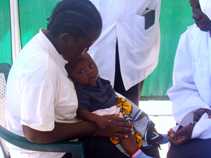Trial Highlights Importance of CDC Work "In the Field"

The first baby who received the malaria vaccine at the KERMI/CDC site.
The trial also shines a light on the value of CDC work in the field. Remarking on the results, Dr. Kayla Laserson, director of the KEMRI/CDC Research and Public Health Collaboration, said, “Our KEMRI/CDC platform has now contributed to three vaccine trials—rotavirus, malaria, and TB. We are well positioned to apply lessons learned from these trials, such as strict regulatory procedures; clinical, laboratory and diagnostic support; and specimen transportation and management, not only to future vaccine trials but to other life-saving public health research.”
CDC-Kenya Country Director Dr. Robert Breiman noted that CDC and KEMRI involvement in the trial “highlights one of the many values of maintaining a strong surveillance and research system in the field.” The KEMRI/CDC Health and Demographic Surveillance System (HDSS) was used during the trial to locate children who were in the age range needed for the trial. Because every household is mapped in the HDSS, the study team was able to approach the parents of children who met the age eligibility criteria. The team visited with the parents in their homes to describe the trial and answer questions. The parents were then invited to come to the study clinic for more information, consenting, and enrollment. The mapping has also helped locate children for monthly visits, or to contact parents when a child’s test results show that treatment is required. Finally, the long-standing relationship KEMRI/CDC has had with the community—resulting in a deep level of trust— has facilitated both enrollment and conduct of the trial. “There is a great deal for us to be collectively proud of as we view these first results from the malaria vaccine trial. First, we continue to evolve and strengthen local capacity to conduct first-rate field research. And, we have taken part in another groundbreaking investigation that we expect will save lives,” he added.
Notes CDC Malaria Branch Chief Dr. S. Patrick Kachur, “The benefits of this vaccine research are very tangible for our Malaria Branch programs. Participating in a multisite trial like this one helps CDC scientists contribute at the cutting edge of new developments for malaria control. It helps strengthen our decades-long partnership with researchers in Kenya, and helps us forge connections with other leading research groups across the continent. This helps us to ask better questions that will improve malaria prevention and control across a wide range of settings.”
Recent Successes in Malaria Control
In the last decade, thanks to sharp increases in global funding for malaria, many malaria-endemic countries have been able to scale up the distribution and use of safe, effective, and affordable life-saving malaria interventions: insecticide-treated bed nets, antimalarial drugs, drugs to protect pregnant women and their fetuses from malaria’s adverse effects, and indoor residual insecticide spraying to prevent malaria’s mosquito-borne transmission. In many of these countries, the scale-up has contributed to decreases of up to 50% in all-cause mortality in children under 5 years of age.
This encouraging trial gives hope that the world will soon be able to add another tool to the current malaria interventions that will help move the world closer to the goal of ending malaria deaths.
Partnership
The successful and rigorous conduct of the trial, which has required standardization across 11 African sites and adherence to Good Clinical Practice and Good Clinical and Laboratory Practice guidelines, is a tribute to the African institutions and scientists leading the trial and a testament to their ability to conduct high quality research, according to Hamel.
“I feel honored to be part of this team,” she says. “Working with and learning from African researchers who are some of the world’s leading malariologists has been very rewarding.“ Hamel adds, “I am looking forward to the day when African children at risk receive a malaria vaccine as part of their routine childhood vaccinations, along with an insecticide-treated bed net—and I hope to see that day very soon.”
More Information
- Page last reviewed: March 19, 2014
- Page last updated: March 19, 2014
- Content source:


 ShareCompartir
ShareCompartir